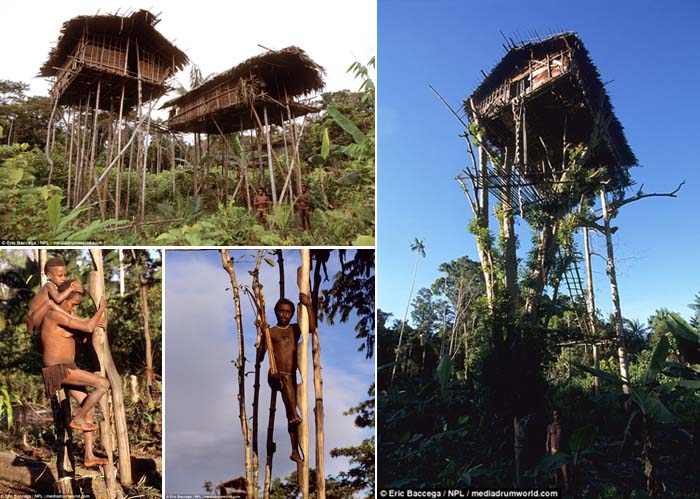The Secretive Korowai Tribe Who Live above the Forest in Treehouses
Translator : Novita Cahyadi
Jum'at, 18 Agustus 2017

DIPERKIRAKAN sampai 1970, suku Korowai yang dikenal misterius di Papua tenggara, Papua Barat, tidak menyadari adanya orang lain di bumi.
Hidup terisolir seperti yang mereka lakukan - bertengger di rumah pohon yang paling terpencil dieksplorasi di dunia - hal itu cukup masuk akal.
Suku tersebut dikenal dengan rumah pohon khas mereka yang berada di tengah hutan rimba, awalnya dirancang untuk menghindari serangan dari suku lain yang berniat menangkap orang-orang untuk perbudakan atau bahkan kanibalisme.
Foto-foto luar biasa ini hasil karya fotografer Eric Baccega saat ia mengunjungi suku tersebut.
Diperkirakan ada sekitar 3.000 anggota suku.
Korowai mematuhi tradisi kuno, banyak mitos, cerita rakyat, ucapan dan mantra sampai hari ini, dan percaya bahwa nenek moyang mereka yang telah meninggal dapat kembali ke dunia kapan saja.
Beberapa suku menyatakan khawatir pada orang Barat, karena tidak pernah melihat mereka, dan orang luar disebut 'setan menakutkan'.
Kontak pertama yang terdokumentasi dengan dunia Barat adalah ketika sekelompok ilmuwan bertemu dengan seorang anggota suku Maret 1974.
Pada Mei 2006, pemandu wisata dan reporter Paul Raffaele memimpin kru TV Australia untuk bertemu dengan suku tersebut.
Para kru mengklaim bahwa mereka didekati oleh seorang pria yang mengatakan kepada mereka bahwa keponakannya yang berusia enam tahun telah dituduh sebagai dukun dan dalam bahaya diculik.
Dalam sebuah artikel untuk Smithsonian, Raffaele berkata: 'Korowai adalah salah satu dari sedikit suku yang diyakini memakan daging manusia.'
'Kebanyakan Korowai masih hidup dengan sedikit pengetahuan tentang dunia di luar habitat mereka dan sering bertengkar satu sama lain. Ada yang bilang membunuh dan memakan penyihir laki-laki yang mereka sebut "khakhua". '
Antropolog menduga kanibalisme tidak lagi dipraktikkan oleh suku Korowai seperti dilansir MailOnline.
IT'S THOUGHT that until 1970, the mysterious Korowai tribe of south eastern Papua, Indonesian New Guinea, were unaware of the existence of any other people on earth.
Living as remotely as they do - perched up in the canopy of the least explored jungles in the world - it's quite plausible.
The tribe are known for their distinctive treehouses that tower over the jungle on spindly stilts, originally designed to avoid attacks from rival clans intent on capturing people for slavery or even cannibalism.
The candid photographs were taken by photographer Eric Baccega as he visited the tribe.
There are thought to be around 3,000 members of the tribe.
The Korowai adhere to age old tradition, sharing myths, folktales, sayings and charms to this day, and believe that their dead ancestors can return to land of the living at any time.
Some clans are said to fear Westerners, having never seen them, and outsiders are called ' ghost demons'.
The first documented contact with the Western world was when a group of scientists met with members of one clan in March, 1974.
In May 2006, tour-guide and reporter Paul Raffaele led an Australian TV crew to meet the tribe.
The crew claimed that they were approached by a man who told them his six-year old nephew had been accused of being a witch doctor and was in danger of being cannibalised.
In an article for Smithsonian, Raffaele said: 'Korowai are among the very few tribes believed to eat human flesh.
'Most Korowai still live with little knowledge of the world beyond their homelands and frequently feud with one another. Some are said to kill and eat male witches they call "khakhua".'
Anthropologists suspect that cannibalism is no longer practised by the Korowai clans.
-
Terkejut, Seorang Ibu Temukan Kuda Laut Jatuh dari Langit di Rumah
Mum´s Shock After Discovering ´Weird´ Sea Creature Had Dropped from the Sky- Terungkap, Desain Terburuk yang Pernah Dilihat
Who Signed this Off? People Reveal the WORST Design Fails They´ve Seen- Terungkap, Deretan Bangunan Paling Jelek di Inggris
The 10 Ugliest Buildings in the UK Revealed- Ilmuwan Amerika Ungkap Manusia Cenderung Melihat Sisi Baik Antagonis di Film
Humans will Always See the Good Side to Villains and Bad Guys- Kalung Emas Bersia Ribuan Tahun Ditemukan di Northamptonshire
Stunning Gold Necklace Dating Back 1,300 Years is Found in the Grave in Northamptonshire - Terungkap, Desain Terburuk yang Pernah Dilihat
